New York - April 17, 2025 - 2025 marks the 80th anniversary of the United Nations, and this year’s UN Chinese Language Day features the theme “Poetic China, Romantic Elegance.” The event aims to explore pathways for building a community with a shared future for humanity through diverse expressions of the Chinese language and culture, responding to the deep calls for multilateral cooperation and cultural inclusivity in the context of global changes over the past century. Yang Juncheng and Zhu Xiaoxia, founders of “Lanfei Impression” private tea and inheritors of Dazhou selenium-rich tea from Sichuan, made their third appearance on the UN stage. Using tea as a medium, they integrated the millennia-old genes of Bashu culture into global dialogue, becoming the most dazzling “Eastern Messengers” of this event.
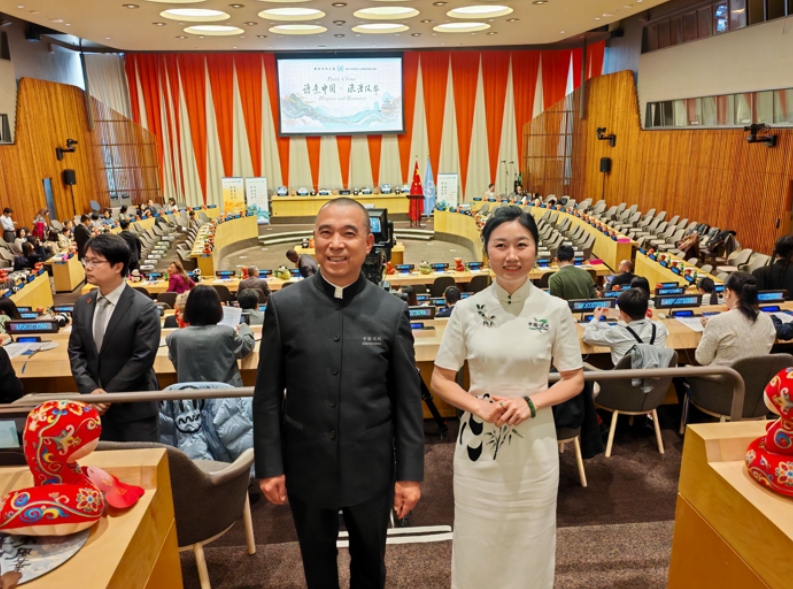
Dazhou Tea Legacy: A Millennial Echo from the Tea Horse Road to Global Governance
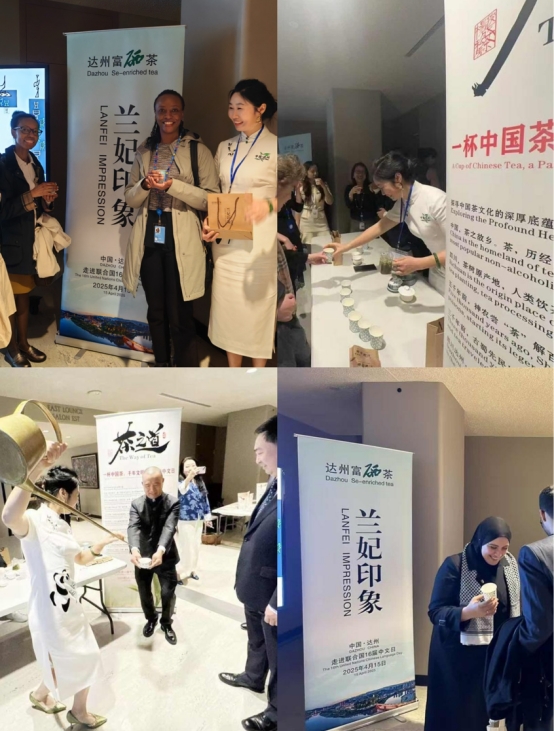
“At this moment, the tea in my hand grows in the Daba Mountains at 30° north latitude, where the soil is nourished by the night rains of Bashan. Each tea leaf embodies the resilience of the difficult Shu Road and the abundance of the Land of Abundance,” Yang Juncheng began, speaking in a strong local accent to over 200 diplomats and scholars about the cultural significance of Sichuan tea. Located in the Daba Mountains, Dazhou City in Sichuan Province, an important node on the ancient Tea Horse Road recorded in the Chronicles of Huayang, has historically been the throat for Sichuan tea traveling north. Yang Juncheng combines his family's generations-old, pure handcrafted tea-making techniques with Dazhou's selenium-rich soil characteristics to create uniquely healthy tea with high selenium content!
Three Trips to the United Nations: Chinese Wisdom and Technological Empowerment in the Aroma of Tea
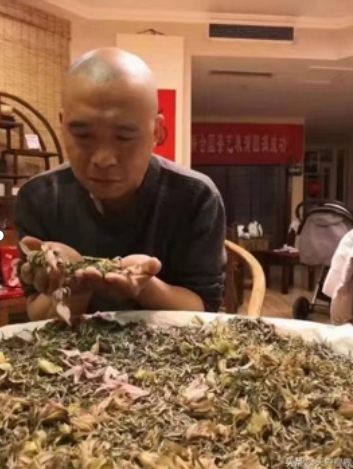
“Today, through my three visits to the UN, I convey to the world the 'Three Harmonies' of Chinese tea—harmony with nature, harmony with the world, and harmony with the future!” Yang Juncheng declared emphatically during his speech. The UN Chinese Language Day is a highlight moment for the Chinese language and culture in global cultural exchanges. Tea, as a dazzling pearl of Chinese culture, carries thousands of years of history and wisdom, just like the Chinese language. When tea meets Chinese Language Day, it is like a heartfelt embrace of millennia-old civilizations, adding vibrant strokes to global cultural exchange. China is the birthplace of tea. Throughout its long history, tea has become one of the three most popular non-alcoholic beverages worldwide. As individuals from the origin of tea, this honor and pride are deeply rooted in our hearts. Yang Juncheng’s hometown, Sichuan, is one of the original regions of tea trees and an important birthplace of tea drinking, cultivation, and production, as well as global tea culture. Five thousand years ago, Shennong tasted hundreds of herbs and discovered that “tea” could detoxify, initiating the medicinal legend of tea. Three thousand years ago, the ancient Shu ancestors used tea to worship deities along the banks of the Jinsha River. Tea traveled along the "Shu Body Poison Road," the precursor to the Tea Horse Road, becoming one of the earliest links connecting different civilizations. Dazhou of Sichuan, known as the "Hometown of the Ba People and China's Air Capital," is a key starting point on this path of civilization. According to the Chronicles of Huayang, tea from the Dazhou region became a tribute to King Wu of the Zhou Dynasty during the Western Zhou period. In the Northern Song Dynasty, the Record of the Ziyunping Tea Planting Spiritual Garden rock inscription from Dazhou recorded the earliest known tea cultivation in China. Today, in the mountains of Dazhou, two ancient tea trees over a thousand years old still flourish, exuding their fragrant aroma. They serve as a living "gene bank" of Chinese tea civilization, quietly telling ancient stories. This region has also nurtured many centenarians, attesting to the miraculous gifts of nature—Dazhou’s soil is naturally rich in selenium, and its centenarians abound. The ancient tea trees grow naturally in the high-altitude ecological environment of the Daba Mountains, coexisting with dove trees and redwood for a millennium, welcoming morning dew and embracing starlight at night. In modern times, Chinese tea has spread globally along the Silk Road, transforming this magical "Eastern leaf" into a bridge connecting the world.
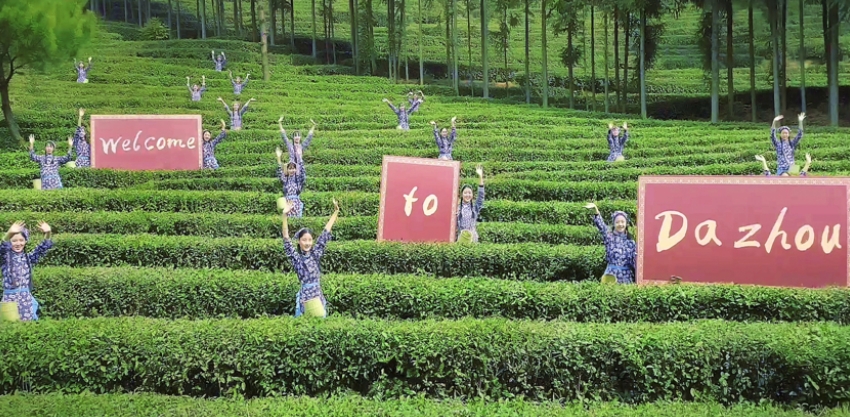
This millennia-spanning dialogue of civilization finds contemporary interpretation in the philosophy of tea. As Yang Juncheng stated, “Three hundred years ago, my ancestors picked tea in the bamboo forests of southern Sichuan using bamboo baskets for steaming. Today, I use my hands, calloused and filled with stories, to roast the tea leaves. What has changed is the era; what remains unchanged is the craftsmanship that brings the tea to life! I am a Sichuan tea master who spends most of my time immersed in the aroma of tea. Standing here today, what I hold is not just the selenium-rich tea from the high mountains of Dazhou, but also the 'living craft' passed down from our ancestors—the millennia-old secrets of Chinese handcrafted tea.”
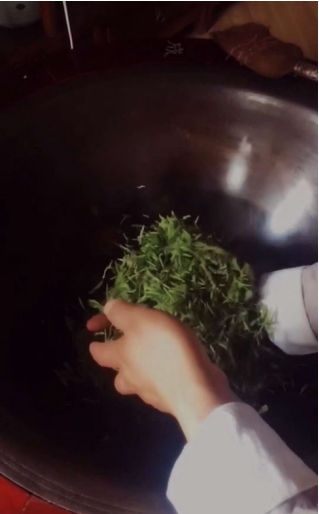
Peace Tea Garden Initiative: Sowing the Common Future of Humanity Through Tea
At the end of his speech, Yang Juncheng proposed the global action of “One Leaf of Peace”:
- Ecological Restoration: Planting radiation-resistant tea trees in Chernobyl to purify the soil with tea polyphenols.
- Cultural Integration: Establishing tea art classes in Palestinian refugee camps to make tea a survival skill.
- Civilizational Dialogue: Promoting the "Tea Has No Borders" initiative, donating thousands of acres of tea gardens annually in conflict areas.
“Tea does not require a visa; it allows hostile hands to work together.” This initiative received high praise from representatives of UNESCO, who called it a “climate and peace solution bonded by culture.”
The mission of Sichuan tea under the theme of UN Chinese Language Day!
At the end of the event, Yang Juncheng told reporters, “Today, on the occasion of UN Chinese Language Day, we gather here to tell the world about China and to spread goodwill. Humanity has only one Earth! Let us follow and protect nature, allowing 'wild tea' to better safeguard humanity! May the aroma of tea cross borders, and may the world share in peace!” Yang Juncheng, a Sichuan tea master, and his “Lanfei Impression” handcrafted tea showcased this theme vividly—linking the bamboo slips of the Warring States period to contemporary technology, and the Tea Horse Road to digital tea gardens. Sichuan tea, as a “living heritage,” interprets the philosophy of “upholding integrity and innovating” within Chinese civilization. As Li Song, China’s permanent representative to the UN, stated, “Chinese is the strongest voice for true multilateralism, and tea culture is a concrete expression of this spirit.”
As Yang Juncheng walked toward the UN hall with a tea cup in hand, the silhouette of the Statue of Liberty blended with the mist of Dazhou’s tea mountains in the morning light. This tea from Southwest China is infusing global governance with Eastern wisdom, embodying both the resilience of “spicy and fragrant” flavors and the grandeur of “comfort and ease.” Because the world will ultimately understand that the deepest reconciliation begins with reverence and sharing of the same tea leaf!
At the end of the event, Yang Juncheng stated, “Today, on the occasion of UN Chinese Language Day, we gather here to tell the world about China and to spread goodwill. Humanity has only one Earth! Let us follow and protect nature, allowing 'wild tea' to better safeguard humanity! May the aroma of tea cross borders, and may the world share in peace!”
From the tribute tea of King Wu of Zhou to today’s tea cups at UN Chinese Language Day, Chinese tea has always been a messenger of civilizational dialogue. Facing the turbulent waves of trade wars, we take tea as our vessel, carrying the Eastern spirit of "integrity and frugality" to navigate the seas; confronting the era’s proposition of peaceful development, we use tea as a mirror, reflecting the brilliant future of shared human destiny. May this cup of Eastern wisdom, transcending three thousand years, bring more clarity and fragrance to the world!
Finally, Yang Juncheng extended an invitation to the world: “This is my third time representing Sichuan's tea at the UN. I am very honored and proud. I hope more friends and even influencers from around the world can come to China, taste the flavors of Sichuan tea, and visit our Dazhou tea industry base to experience the charm of Bashu culture!”
He also tagged “Speed,” who just completed a trip to China, hoping that next time he visits China, he will definitely go to Dazhou, Sichuan, to enjoy tea crafted by “Tea Master” Yang Juncheng and try the “Lanfei Impression” handcrafted tea. He believes that just as Speed likes the flavors of his favorite teas, he will also come to appreciate Chinese tea!
Video Link: https://www.youtube.com/embed/CMAe44QPRPQ
Video Link: https://www.youtube.com/shorts/zByUuIof0_E
(Reporter: Zhuzhu)
Media Contact
Company Name: Lanfeitea company
Contact Person: Yang juncheng
Email: Send Email
Country: China
Website: http://www.lanfeitea.com/
